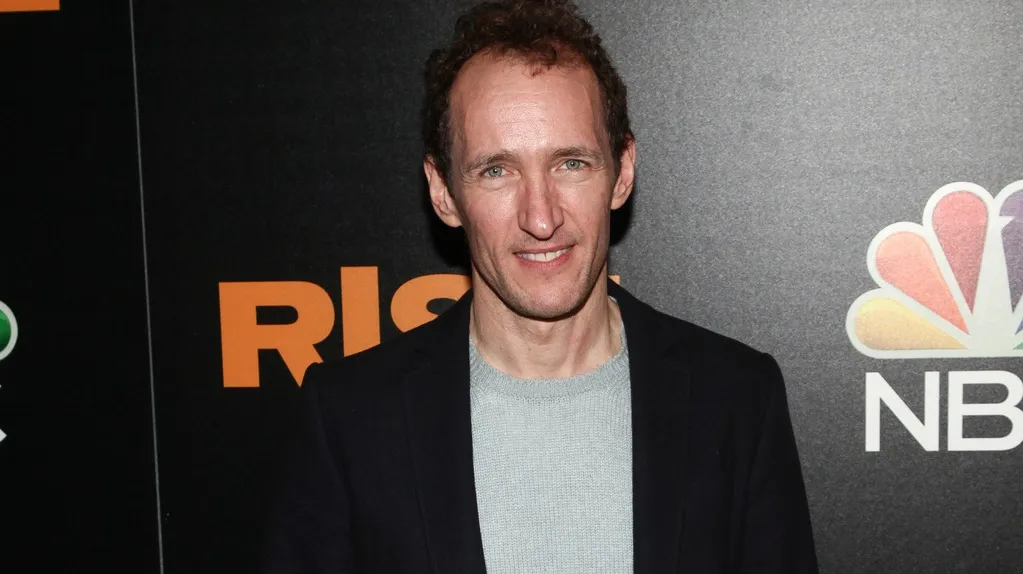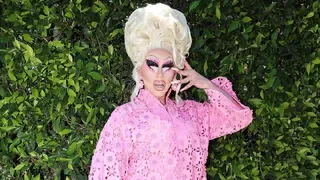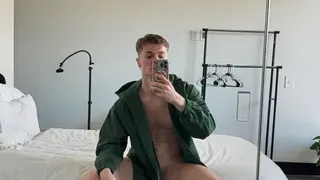October 24, 2012
Tom Hanks & Halle Berry :: Time-trip & shape-shift in 'Cloud Atlas'
Fred Topel READ TIME: 7 MIN.
David Mitchell's book "Cloud Atlas" was considered unfilmable by many, including the author. But screenwriter/directors Lana and Andy Wachowski and Tom Tykwer thought of a way to make it work. In the past the trio have shown they have the cred to bring to film stories that push the cinematic envelope: the Waschowskis are responsible for "The Matrix," while Tykwer turned heads with his international hit "Run Lola Run;" films that dealt with alternate realities and time-tripping narratives.
Mitchell's book contains six different narratives, each in a different time and written in a different literary style. The filmmakers chose to cast the same actors in each story (as with a theatrical repertory company) so viewers would start making connections between the characters in different eras. They then chose to tell the stories simultaneously to further underscore their connections.
Oscar winners Tom Hanks and Halle Berry each star as six different characters, sometimes playing different races and genders. They are joined in this casting coup by Hugo Weaving, Jim Broadbent, Hugh Grant, Susan Sarandon, Keith David, Doona Bae, Jim Sturgess, James D'Arcy and Ben Whishaw.
A daunting task
For Hanks, it was a challenge he was ready to take on, though when he first read the script, it seemed a daunting task.
"If you're to read the screenplay, you would see that, just like in the film, someone walks out of the room in 1934 and walks into a room in the year 3000, and it's all the same beat, it's all the same emotion, it's the same color," Hanks said. "So my fear was, 'I've got six characters. I'm going to choke on two of them, at least. I'm going to blow it.' In baseball, you're still batting four out of six. That's pretty good. There were some of the one-offs, particularly, when you were just working for a day or two, that you say, 'Man, I hope the magic comes!'"
Berry relates that she got to play a Korean man (Dr. Ovid) and a Caucasian woman (Jacosta Ayrs) in two of the stories. "Had it not been for a movie like this that required each person to play all of these characters to fulfill the theme of the movie, nobody would have ever picked me to play an Asian man or a Jewish German woman, ever," Berry said. "There was a knowingness when this was happening that this was pretty special and, as artists, we should soak in every moment of what this process is. Every day that Ovid [makeup] was on, I enjoyed what that felt like and what that was about. I can't remember the last time I had this much fun on a movie."
Six stories
In the simplest, terms, the six stories of "Cloud Atlas" are as follows. In the first, set in 1849, An American slave trader (Sturgess) faces a critical illness while taking a ship home from the Pacific Islands with a slave stowed away in his cabin. The second, set in the 1930s, follows a gay music student (Whishaw) that comes to work for a legendary composer (Broadbent). He reinvigorates the composer and discovers his own genius, to tragic ends. A third story is set in 1973, and is a conspiratorial thriller in which a journalist (Berry) uncovers a scandal at a nuclear power plant.
The contemporary story is a comic episode in which a British publisher, named Timothy Cavendish (Broadbent), gets forcibly committed to a retirement home, run by Nurse Ratchet-like supervisor (Weaving). The fifth narrative is a sci-fi adventure set in a Seoul in 2144 in which a programmed young woman (called a "fabricant") escapes her controlled environment and ferments a revolution. The sixth story is set in post-apocalyptic Hawaii in which mankind has regressed to primitive behavior. In it a tribal leader (Hanks) assists a futuristic visitor (Berry) in a journey that could save mankind.
In Mitchell's novel, the stories are told consecutively; in the film, they're told simultaneously.
Repertory feel
The repertory feel of the company of actors has some playing leads in one story, supporting roles in others. "We always knew who we were playing, the next day," Hanks said. "We'd read the call sheet at the end of the day, so we knew where we were going to have to be and how long it was going to take to do it.
"Sometimes you make films where you're playing the same guy, but you go to six different locations. You shoot part of it in Iceland, you shoot part of it in the Sahara desert and you shoot part of it in L.A. This was like that, but squared or cubed. It was like an algorithm because the concentration and the output of each one of the characters was so completely different. They all required a different energy. They all required a different vibe that you carried around with you all day, and they all felt different because the costume and the make-up literally changed the way you stood or sat or tried to take a nap, on occasion.
"It was almost like a huge amount of the 'work' was done for us. So much of what we have to do is pretend it was happening for the first time. On this movie, every day you were doing something that would never, ever be repeated because that character would be going to go away in a day or two."
Three directors
Movies always shoot out of sequence, but "Cloud Atlas" had two crews going simultaneously. The Wachowskis would be shooting one of the three narratives they were taking on, while Tykwer was on another location filming one of his three.
According to the film's Wiki page: "The Wachowskis directed the nineteenth-century story and the two set in the future, while Tykwer directed the stories set in the thirties, the seventies, and the present day."
Berry admitted an element of confusion was present as she dealt with her co-stars.
"One day I had a conversation with Hugh Grant, and for five minutes I had no idea [it was him]. He was fully in his character, and I didn't even know until five minutes [into the conversation]. I was like, 'Hugh? I'm talking to Hugh?' I had no idea.
"To see everybody else sit in the make-up trailer and be transformed; then walk out as somebody else, was fun. For example, when I first saw Hugo [Weaving] as Nurse Noakes, I just about fell out. That was one of the funniest images I think I'd ever seen. He was out there, smoking and talking in his deep voice, but looking like this woman. There were moments that I just want to crystalize in my mind to take from this movie."
’Friggin’ extraordinary’
Because of this schedule, the complete cast never shares scenes together. It had to be coordinated so that if Berry and Hanks were filming one scene, Broadbent and Sturgess could film another.
They were, though, together once.
"It was for a read-through in Germany, before we all got started," Berry recalled. "Not every single person was there, but almost the entire cast was there for that. I think that was such a great experience because Tom Tykwer, who did the score, played the music, so we heard what it would sound like. It was already written before we even started. There were pictures, all over the walls, of the sets and the characters, so we were able to go into this world.
"We heard the lines being read by the real actors,for the very first time in this room. Then we went off in our different directions to do our stuff. But I think because of that first meeting, we solidified our connection, and realized that we were all in this, playing our parts and supporting each other."
Each time Hanks and Berry met one of their co-stars, it was a new thrill, though sometimes disconcerting. For instance when Hanks met Chinese actress Xun Zhou, she was playing dead. It came in a scene where the actor discovered her body. "It was like Movie-Making 101," he recalled. "All right." Hanks then slipped into the voice of one of the Wachowskis: "'This is your sister. You love her very much. She helped raise you. She's the mother of the little girl. And she's dead now, so you're very upset about that. She's been murdered. All right, and action!'"
It is up to the audience to make connections between the stories of past, present and future and take from it any spiritual messages they will. The filmmakers and actors helped things along by injecting their own motifs, but it is an interpretive piece. Hanks, however, took a powerful message out of the various characters Hugh Grant plays.
"Hugh Grant always talks about the status quo, that there is a natural order of things," Hanks said. "And in each story, the natural order of things enslaves people; [as if to suggest] some people are meant to be kept down, and you just can't change things. Well, that's not what the human condition or human history has shown again and again and again and again. Things can change. I just think it's friggin' extraordinary."
"Cloud Atlas" opens Friday.
Watch the trailer to Cloud Atlas:






